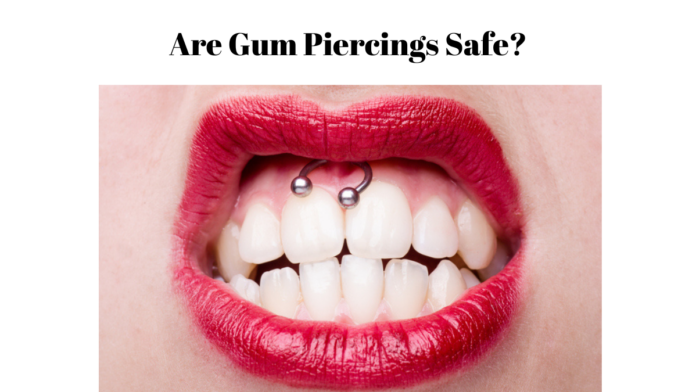Gum piercing, also known as smiley or frenulum piercings, are a popular form of self-expression among some people. They involve piercing the small flap of tissue that connects the gums to the lips, either on the upper or lower part of the mouth. When you smile, the jewellery peeks out and sparkles your grin.
But are gum piercings safe? What are the risks and complications involved? Moreover, how can you take care of your piercing to avoid infections and damage to your teeth and gums?
In this article, we will answer these questions and provide you with some tips and advice on gum piercings.
What are the risks of gum piercings?
According to the American Dental Association (ADA), oral piercings can be particularly risky since millions of bacteria live in the mouth. There is a greater risk of infection when you pierce the inside of your mouth versus getting your ears pierced because of the bacteria.
Some of the common complications of gum piercings include:
- Infection and swelling: Bacteria at the piercing site may cause pain, redness, swelling, and pus. If left untreated, the infection may spread to other parts of the mouth or even the bloodstream, which can cause serious health issues.
- Its piercing can lead to bleeding, which is hard to control. Bleeding in excess can also cause blood loss and shock.
- Allergic reaction: Individuals may be hypersensitive to the metal in the jewellery, especially if it is not of surgical quality. This may lead to itchiness, rash, swelling and irritation on the piercing site.
- Damage to teeth and gums: The jewellery can wear into the tooth surfaces, causing enamel loss, sensitivity, decay, and fractures. It can also irritate gum tissue, cause inflammation, recession, and bleeding, eventually leading to tooth loss and gum disease.
How to care for your gum piercing?
If you already have a gum piercing or decide to get one, you must take good care of it to prevent infections and complications. Here are some tips on how to care for your gum piercing:
- Ensure you go to a professional piercer with expertise and observe proper hygiene and safety standards. Inquire about the risks, procedure, recovery, and type of jewellery they use. Do not attempt to do it yourself or go to unlicensed or inexperienced piercers.
- Gargle your mouth with a saltwater solution or alcohol-free mouthwash at least twice daily, preferably after meals or beverages. This will ensure your mouth remains clean and free from bacteria building around the piercing area. Do not use harsh or minty products because they can damage the wound and slow healing.
- Ensure the brush does not touch the piercing site, as this may cause pain and bleeding. You might also like to consider using fluoride toothpaste, which helps prevent enamel erosion.
- During the first couple of weeks, avoid consuming anything that is too warm, chilly, hot, acidic or sticky because they may irritate the piercing site and cause inflammation. Additionally, do not consume alcohol, tobacco, or caffeine because they can cause mouth drying and increase the chance of developing an infection. Take enough water to moisten your mouth and remove any food particles.
- Visit your dentist at least twice in a year for a regular checkup and cleaning. Your dentist can check your piercing site and oral health and identify problems early on. They can also guide you on the appropriate measures to take to avoid or cure any complications that may be brought about by gum piercing.
Conclusion
Gum piercings can be a fun and fashionable way to express yourself, but they also come with many risks and challenges. Before you get a gum piercing, you should weigh the pros and cons and consult your dentist.
Some FAQs
What is a gum piercing?
A gum piercing, also known as a smiley or frenulum piercing, is made through the small flap of tissue connecting the gums to the lips. It is usually done on the upper part of the mouth, above the front teeth, but it can also be done on the lower part, below the front teeth.
What are the risks of gum piercings?
Gum piercings can pose several risks, such as infection, swelling, bleeding, scarring, embedded jewellery, allergic reactions, damage to the teeth and gums, and rejection by the body. These risks can be reduced by following proper aftercare and hygiene practices and by choosing high-quality jewellery made of surgical-grade metal or gold.















